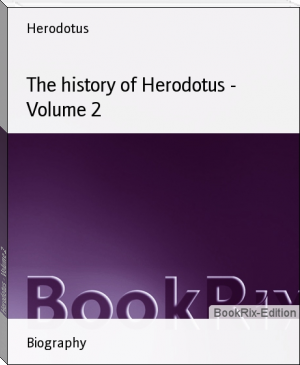The history of Herodotus - Volume 2 - Herodotus (manga ereader txt) 📗

- Author: Herodotus
Book online «The history of Herodotus - Volume 2 - Herodotus (manga ereader txt) 📗». Author Herodotus
summoned Demaratos and inquired of him, having first said this: "Demaratos, thou art a good man; and this I conclude by the truth of thy words, for all that thou saidest turned out so as thou didst say. Now, however, tell me how many in number are the remaining Lacedemonians, and of them how many are like these in matters of war; or are they so even all of them?" He said: "O king, the number of all the Lacedemonians is great and their cities are many, but that which thou desirest to learn, thou shalt know. There is in Lacedemon the city of Sparta, having about eight thousand men; and these are all equal to those who fought here: the other Lacedemonians are not equal to these, but they are good men too." To this Xerxes said: "Demaratos, in what manner shall we with least labour get the better of these men? Come set forth to us this; for thou knowest the courses of their counsels,[236] seeing that thou wert once their king." 235. He made answer: "O king, if thou dost in very earnest take counsel with me, it is right that I declare to thee the best thing. What if thou shouldest send three hundred ships from thy fleet to attack the Laconian land? Now there is lying near it an island named Kythera, about which Chilon, who was a very wise man among us, said that it would be a greater gain for the Spartans that it should be sunk under the sea than that it should remain above it; for he always anticipated that something would happen from it of such a kind as I am now setting forth to thee: not that he knew of thy armament beforehand, but that he feared equally every armament of men. Let thy forces then set forth from this island and keep the Lacedemonians in fear; and while they have a war of their own close at their doors, there will be no fear for thee from them that when the remainder of Hellas is being conquered by the land-army, they will come to the rescue there. Then after the remainder of Hellas has been reduced to subjection, from that moment the Lacedemonian power will be left alone and therefore feeble. If however thou shalt not do this, I will tell thee what thou must look for. There is a narrow isthmus leading to the Peloponnese, and in this place thou must look that other battles will be fought more severe than those which have taken place, seeing that all the Peloponnesians have sworn to a league against thee: but if thou shalt do the other thing of which I spoke, this isthmus and the cities within it will come over to thy side without a battle." 236. After him spoke Achaimenes, brother of Xerxes and also commander of the fleet, who chanced to have been present at this discourse and was afraid lest Xerxes should be persuaded to do this: "O king," he said, "I see that thou art admitting the speech of a man who envies thy good fortune, or is even a traitor to thy cause: for in truth the Hellenes delight in such a temper as this; they envy a man for his good luck, and they hate that which is stronger than themselves. And if, besides other misfortunes which we have upon us, seeing that four hundred of our ships[237] have suffered wreck, thou shalt send away another three hundred from the station of the fleet to sail round Peloponnese, then thy antagonists become a match for thee in fight; whereas while it is all assembled together our fleet is hard for them to deal with, and they will not be at all a match for thee: and moreover the whole sea- force will support the land-force and be supported by it, if they proceed onwards together; but if thou shalt divide them, neither wilt thou be of service to them nor they to thee. My determination is rather to set thy affairs in good order[238] and not to consider the affairs of the enemy, either where they will set on foot the war or what they will do or how many in number they are; for it is sufficient that they should themselves take thought for themselves, and we for ourselves likewise: and if the Lacedemonians come to stand against the Persians in fight, they will assuredly not heal the wound from which they are now suffering."[239] 237. To him Xerxes made answer as follows: "Achaimenes, I think that thou speakest well, and so will I do; but Demaratos speaks that which he believes to be best for me, though his opinion is defeated by thine: for I will not certainly admit that which thou saidest, namely that he is not well-disposed to my cause, judging both by what was said by him before this, and also by that which is the truth, namely that though one citizen envies another for his good fortune and shows enmity to him by his silence,[240] nor would a citizen when a fellow-citizen consulted him suggest that which seemed to him the best, unless he had attained to a great height of virtue, and such men doubtless are few; yet guest- friend to guest-friend in prosperity is well-disposed as nothing else on earth, and if his friend should consult him, he would give him the best counsel. Thus then as regards the evil-speaking against Demaratos, that is to say about one who is my guest-friend, I bid every one abstain from it in the future."
238. Having thus said Xerxes passed in review the bodies of the dead; and as for Leonidas, hearing that he had been the king and commander of the Lacedemonians he bade them cut off his head and crucify him. And it has been made plain to me by many proofs besides, but by none more strongly than by this, that king Xerxes was enraged with Leonidas while alive more than with any other man on earth; for otherwise he would never have done this outrage to his corpse; since of all the men whom I know, the Persians are accustomed most to honour those who are good men in war. They then to whom it was appointed to do these things, proceeded to do so.
239. I will return now to that point of my narrative where it remained unfinished.[241] The Lacedemonians had been informed before all others that the king was preparing an expedition against Hellas; and thus it happened that they sent to the Oracle at Delphi, where that reply was given them which I reported shortly before this. And they got this information in a strange manner; for Demaratos the son of Ariston after he had fled for refuge to the Medes was not friendly to the Lacedemonians, as I am of opinion and as likelihood suggests supporting my opinion; but it is open to any man to make conjecture whether he did this thing which follows in a friendly spirit or in malicious triumph over them. When Xerxes had resolved to make a campaign against Hellas, Demaratos, being in Susa and having been informed of this, had a desire to report it to the Lacedemonians. Now in no other way was he able to signify it, for there was danger that he should be discovered, but he contrived thus, that is to say, he took a folding tablet and scraped off the wax which was upon it, and then he wrote the design of the king upon the wood of the tablet, and having done so he melted the wax and poured it over the writing, so that the tablet (being carried without writing upon it) might not cause any trouble to be given by the keepers of the road. Then when it had arrived at Lacedemon, the Lacedemonians were not able to make conjecture of the matter; until at last, as I am informed, Gorgo, the daughter of Cleomenes and wife of Leonidas, suggested a plan of which she had herself thought, bidding them scrape the wax and they would find writing upon the wood; and doing as she said they found the writing and read it, and after that they sent notice to the other Hellenes. These things are said to have come to pass in this manner.[242] -----
NOTES TO BOOK VII
1. {kai ploia}, for transport of horses and also of provisions:
however these words are omitted in some of the best MSS.
2. {all ei}: this is the reading of the better class of MSS. The rest
have {alla}, which with {pressois} could only express a wish for
success, and not an exhortation to action.
3. {outos men oi o logos en timoros}: the words may mean "this manner
of discourse was helpful for his purpose."
4. {khresmologon e kai diatheten khresmon ton Mousaiou}.
5. {aphanizoiato}, representing the present tense {aphanizontai} in
the oracle.
6. {ton thronon touton}: most MSS. have {ton thronon, touto}.
7. {epistasthe kou pantes}: the MSS. have {ta epistasthe kou pantes},
which is given by most Editors. In that case {oia erxan} would be
an exclamation, "What evils they did to us, . . . things which ye
all know well, I think."
8. {touton mentoi eineka}: it is hardly possible here to give
{mentoi} its usual meaning: Stein in his latest edition reads
{touton men toinun}.
9. {suneneike}: Stein reads {suneneike se}, "supposing that thou art
worsted."
10. {ep andri ge eni}, as opposed to a god.
11. {akousesthai tina psemi ton k.t.l.}, "each one of those who are
left behind."
12. {kai Kurou}, a conjectural emendation of {tou Kurou}. The text of
the MSS. enumerates all these as one continuous line of ascent. It
is clear however that the enumeration is in fact of two separate
lines, which combine in Teïspes, the line of ascent through the
father Dareios being, Dareios, Hystaspes, Arsames, Ariamnes,
Teïspes, and through the mother, Atossa, Cyrus, Cambyses, Teïspes.
13. {kai mala}: perhaps, "even."
13a. Lit. "nor is he present who will excuse thee."
14. Lit. "my youth boiled over."
15. Lit. "words more unseemly than was right."
16. {all oude tauta esti o pai theia}.
17. {peplanesthai}.
18. {autai}: a correction of {autai}.
19. {se de epiphoitesei}: the better MSS. have {oude epiphoitesei},
which is adopted by Stein.
20. {pempto de etei anomeno}.
21. {ton Ionion}.
22. {kai oud ei eperai pros tautesi prosgenomenai}: some MSS. read
{oud eterai pros tautesi genomenai}, which is adopted (with
variations) by some Editors. The meaning would be "not all these,
nor others which happened in addition to these, were equal to this
one."
23. {ama strateuomenoisi}: {ama} is omitted in some MSS.
24. {stadion}, and so throughout.
25. {entos Sanes}: some MSS. read {ektos Sanes}, which is adopted by
Stein, who translates "beyond Sane, but on this side of Mount
Athos": this however will not suit the case of all the towns
mentioned, e.g. Acrothoon, and {ton Athen} just below clearly
means the whole peninsula.
26. {leukolinou}.
27. {ton de
238. Having thus said Xerxes passed in review the bodies of the dead; and as for Leonidas, hearing that he had been the king and commander of the Lacedemonians he bade them cut off his head and crucify him. And it has been made plain to me by many proofs besides, but by none more strongly than by this, that king Xerxes was enraged with Leonidas while alive more than with any other man on earth; for otherwise he would never have done this outrage to his corpse; since of all the men whom I know, the Persians are accustomed most to honour those who are good men in war. They then to whom it was appointed to do these things, proceeded to do so.
239. I will return now to that point of my narrative where it remained unfinished.[241] The Lacedemonians had been informed before all others that the king was preparing an expedition against Hellas; and thus it happened that they sent to the Oracle at Delphi, where that reply was given them which I reported shortly before this. And they got this information in a strange manner; for Demaratos the son of Ariston after he had fled for refuge to the Medes was not friendly to the Lacedemonians, as I am of opinion and as likelihood suggests supporting my opinion; but it is open to any man to make conjecture whether he did this thing which follows in a friendly spirit or in malicious triumph over them. When Xerxes had resolved to make a campaign against Hellas, Demaratos, being in Susa and having been informed of this, had a desire to report it to the Lacedemonians. Now in no other way was he able to signify it, for there was danger that he should be discovered, but he contrived thus, that is to say, he took a folding tablet and scraped off the wax which was upon it, and then he wrote the design of the king upon the wood of the tablet, and having done so he melted the wax and poured it over the writing, so that the tablet (being carried without writing upon it) might not cause any trouble to be given by the keepers of the road. Then when it had arrived at Lacedemon, the Lacedemonians were not able to make conjecture of the matter; until at last, as I am informed, Gorgo, the daughter of Cleomenes and wife of Leonidas, suggested a plan of which she had herself thought, bidding them scrape the wax and they would find writing upon the wood; and doing as she said they found the writing and read it, and after that they sent notice to the other Hellenes. These things are said to have come to pass in this manner.[242] -----
NOTES TO BOOK VII
1. {kai ploia}, for transport of horses and also of provisions:
however these words are omitted in some of the best MSS.
2. {all ei}: this is the reading of the better class of MSS. The rest
have {alla}, which with {pressois} could only express a wish for
success, and not an exhortation to action.
3. {outos men oi o logos en timoros}: the words may mean "this manner
of discourse was helpful for his purpose."
4. {khresmologon e kai diatheten khresmon ton Mousaiou}.
5. {aphanizoiato}, representing the present tense {aphanizontai} in
the oracle.
6. {ton thronon touton}: most MSS. have {ton thronon, touto}.
7. {epistasthe kou pantes}: the MSS. have {ta epistasthe kou pantes},
which is given by most Editors. In that case {oia erxan} would be
an exclamation, "What evils they did to us, . . . things which ye
all know well, I think."
8. {touton mentoi eineka}: it is hardly possible here to give
{mentoi} its usual meaning: Stein in his latest edition reads
{touton men toinun}.
9. {suneneike}: Stein reads {suneneike se}, "supposing that thou art
worsted."
10. {ep andri ge eni}, as opposed to a god.
11. {akousesthai tina psemi ton k.t.l.}, "each one of those who are
left behind."
12. {kai Kurou}, a conjectural emendation of {tou Kurou}. The text of
the MSS. enumerates all these as one continuous line of ascent. It
is clear however that the enumeration is in fact of two separate
lines, which combine in Teïspes, the line of ascent through the
father Dareios being, Dareios, Hystaspes, Arsames, Ariamnes,
Teïspes, and through the mother, Atossa, Cyrus, Cambyses, Teïspes.
13. {kai mala}: perhaps, "even."
13a. Lit. "nor is he present who will excuse thee."
14. Lit. "my youth boiled over."
15. Lit. "words more unseemly than was right."
16. {all oude tauta esti o pai theia}.
17. {peplanesthai}.
18. {autai}: a correction of {autai}.
19. {se de epiphoitesei}: the better MSS. have {oude epiphoitesei},
which is adopted by Stein.
20. {pempto de etei anomeno}.
21. {ton Ionion}.
22. {kai oud ei eperai pros tautesi prosgenomenai}: some MSS. read
{oud eterai pros tautesi genomenai}, which is adopted (with
variations) by some Editors. The meaning would be "not all these,
nor others which happened in addition to these, were equal to this
one."
23. {ama strateuomenoisi}: {ama} is omitted in some MSS.
24. {stadion}, and so throughout.
25. {entos Sanes}: some MSS. read {ektos Sanes}, which is adopted by
Stein, who translates "beyond Sane, but on this side of Mount
Athos": this however will not suit the case of all the towns
mentioned, e.g. Acrothoon, and {ton Athen} just below clearly
means the whole peninsula.
26. {leukolinou}.
27. {ton de
Free e-book «The history of Herodotus - Volume 2 - Herodotus (manga ereader txt) 📗» - read online now
Similar e-books:





Comments (0)